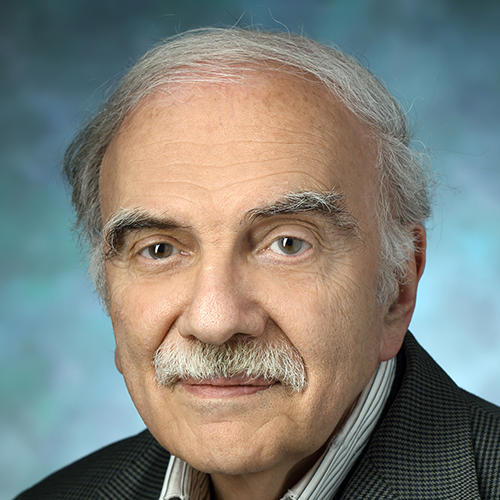In memoriam: L. Mario Amzel
L. Mario Amzel, professor and former director of the department of biophysics and biophysical chemistry at the Johns Hopkins University School of Medicine, died Aug. 28. He was 79.

Amzel was born Oct. 25, 1942, in Buenos Aires, Argentina. He pursued a Ph.D. in physical chemistry from the Universidad de Buenos Aires. Partway through his studies, the Argentinian government was overthrown, and the national universities came under military control. Although many students left, Amzel continued his research using lab space at the Argentinian Atomic Energy Commission.
After earning his doctorate, Amzel was recruited by fellow Argentinian Robert Poljak to join the department of biophysics (now the department of biophysics and biophysical chemistry) at the Johns Hopkins University School of Medicine in 1969. He remained in the department for over 50 years and was department head from 2006 to May 2021.
Amzel’s research focused on determining the structures and functions of proteins and protein complexes. He specifically worked to crystallize and define the structure of an antibody and was part of a team of researchers that produced the first high-resolution images of antibody–antigen recognition, which is critical for immune system function.
Amzel also researched how structure affects the function of PI3K, an enzyme often implicated in cancer, and how proteins regulate sodium channels in cardiac cells, which helps hearts beat.
Throughout his career, Amzel trained 33 graduate students and 15 postdoctoral fellows and authored more than 250 journal articles. He was selected as a Damon Runyon postdoctoral fellow and also won the RAICES Prize from the Ministerio de Ciencia, Technologia e Innovacion Productiva in Argentina. He was a fellow of the Biophysical Society and the American Association for the Advancement of Science.
According to a biography, Amzel spoke about missing Argentinian culture in his new life in the U.S. — he and Poljak were the only two Latinos in the basic sciences at the Johns Hopkins University School of Medicine for several years. As a result, he was a proponent of building a diverse faculty that celebrates cultural differences.
Outside of the lab, Amzel was committed to mentoring Baltimore youth through the Fun with Science Summer Camp and Biophysics Research for Baltimore Teens. Both programs, run by the department, were aimed at getting students into the lab and supporting their futures in science.
Amzel is survived by his partner, Janna Wehrle; one sister; two daughters; and one granddaughter.
Enjoy reading ASBMB Today?
Become a member to receive the print edition four times a year and the digital edition monthly.
Learn moreGet the latest from ASBMB Today
Enter your email address, and we’ll send you a weekly email with recent articles, interviews and more.
Latest in People
People highlights or most popular articles

The timekeepers of proteostasis
Learn about the cover of the winter 2026 ASBMB Today issue, illustrated by ASBMB member Megan Mitchem.

Defining JNKs: Targets for drug discovery
Roger Davis will receive the Bert and Natalie Vallee Award in Biomedical Science at the ASBMB Annual Meeting, March 7–10, just outside of Washington, D.C.

Building better tools to decipher the lipidome
Chemical engineer–turned–biophysicist Matthew Mitsche uses curiosity, coding and creativity to tackle lipid biology, uncovering PNPLA3’s role in fatty liver disease and advancing mass spectrometry tools for studying complex lipid systems.

Summer research spotlight
The 2025 Undergraduate Research Award recipients share results and insights from their lab experiences.

Pappu wins Provost Research Excellence Award
He was recognized by Washington University for his exemplary research on intrinsically disordered proteins.

In memoriam: Rodney E. Harrington
He helped clarify how chromatin’s physical properties and DNA structure shift during interactions with proteins that control gene expression and was an ASBMB member for 43 years.

